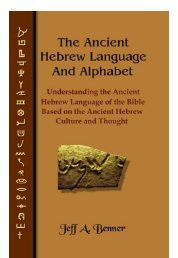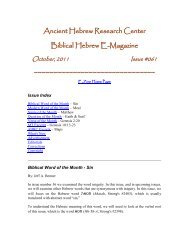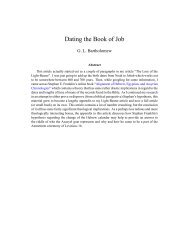My Name Forever - Ancient Hebrew Research Center
My Name Forever - Ancient Hebrew Research Center
My Name Forever - Ancient Hebrew Research Center
You also want an ePaper? Increase the reach of your titles
YUMPU automatically turns print PDFs into web optimized ePapers that Google loves.
<strong>My</strong> <strong>Name</strong> <strong>Forever</strong> 16<br />
51. Something in the way that was written just didn’t sound right. And then it hit me: It’s not the<br />
<strong>Hebrew</strong> which represents the transliteration, but the transliteration which represents the <strong>Hebrew</strong>! What if<br />
we turned the sentence around to reflect reality? “-EH represents the final v and YAHU- represents the<br />
uvh.” That rang a bell. If Yahweh really is an ancient pronunciation, is it possible that it is in essence a<br />
blended form of Yáhu-Hei "v" Uvh - the form Yáhu Uvh and the name of the final letter Hei v spoken at the<br />
end? 51 Could there have been more than one or two original “pseudonyms” used during second temple<br />
times? In addition to Adonai hb«st and HaShem o v, could there have been, or was there also Yáhu-Hei<br />
"v" Uvh? This might account for the occurrences of a few Greek transliterations which seem to<br />
communicate a Yahweh-like sound to our ears. That is, of course, speculation on my part, but apart from<br />
speculation I have no explanation as to its origin.<br />
Summary<br />
52. Those of us who believe that the written Word is the standard by which all things are measured<br />
need to act like it. The practice of addressing the Almighty exclusively by the title, “LORD,” is a<br />
Rabbinical dictum which is not in harmony with the Word. Sure, he is the Master, but that is not his<br />
<strong>Name</strong>, the <strong>Name</strong> by which he wants to be mentioned. We should be using his <strong>Name</strong>. In fact, if we were<br />
following Biblical protocol, we would be using his <strong>Name</strong> ninety-eight percent more often than the<br />
pseudonyms, “Adonai,” or, “LORD.” That’s right - ninety-eight percent! In the <strong>Hebrew</strong> text vuvh is found<br />
alone over 6,600 times and joined with Adonai hb«st (Lord) another 285 times. 52 Compare that with the<br />
140 times Adonai hb«st (Lord) is used by itself, 53 and we can see how far we’ve sailed off course. Isn’t it<br />
about time we threw the worthless compass overboard and started using the one that points north?<br />
53. We began our study by looking for a form of the verb Hei Vav Hei /v/u/v which would<br />
communicate, “He will be.” This is what his <strong>Name</strong> means. We found such a form in Ecclesiastes 11:3.<br />
We found, moreover, that the vowel points of this verb match precisely the form of the <strong>Name</strong> as it<br />
appears in numerous instances at the end of the name, “Michaiah.”<br />
54. Since y’hú tU vh at Ecc. 11:3 is an authentic verbal form, is it not simple deduction to consider the<br />
form Y’hu Uvh at the end of the name, “Michaiah,” as the genuine article as well? Should these two not be<br />
taken as corroborating witnesses? When we can take y’hú tU vh at Ecc. 11:3, exchange the substitute<br />
Aleph t for the original Hei v, and come up with the same thing as when we take Y’hu Uvh within the<br />
name MikháY’hu Uvhfh n (Michaiah), and restore the proper accent and dropped Hei v, do we not have<br />
everything we need to identify vU vh as the authentic form of the <strong>Name</strong>? Let me diagram it.<br />
51 Try saying Yáhu-hei "v" Uvh quickly and repetitively sometime and see what comes out of your mouth.<br />
52 Even-Shoshan: Concordantziah , pp. 17-18, 440-448. /448-440 '18-17 ws 'vh<br />
m b srIebIe :i JIJ-ic t<br />
53 Even-Shoshan: Concordantziah , pp. 17-18. /18-17 ws '<br />
:i JIJ-ic t<br />
vh m b srIebIe






